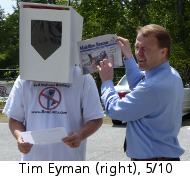11/10/2011
Washington: More Anti-Camera Initiatives to ComeAfter winning four of four anti-camera initiative votes, photo enforcement opponents vow to stop the cameras.

Washington State ballot initiative guru Tim Eyman vowed Wednesday to put even more pressure on municipalities he sees as dependent on automated ticketing revenue. Eyman is feeling good after voters on Tuesday rejected cameras by comfortable margins in three of three contests on Tuesday. Larger jurisdictions are now in his sights.
"For us, it's full steam ahead," Eyman told TheNewspaper. "I'm gung-ho to do a couple more cities and keep the ball rolling. I've never found a more effective way to lobby the legislature than to say, 'You either do it, or we're just going to pick you off one city at a time.'"
Last year, 71 percent of voters in Mukilteo approved a measure outlawing cameras. On Tuesday, 65 percent of the voters in Bellingham, 65 percent in Monroe and 59 percent in Longview felt the same way. Local politicians in some jurisdictions are starting to realize the public is not on their side. Last week, Redmond's city council voted 7-0 to allow its red light camera contract with American Traffic Solutions (ATS) to expire on January 31, 2012.
"Collision data indicate that the impact of traffic safety cameras on collisions in Redmond is inconclusive," Police Chief Ron Gibson wrote in a memo to the city council.
Voters in Redmond had submitted a valid petition to order the issue placed on the ballot earlier this year, but the city convinced a judge to block citizens from petitioning their government, even in an advisory-only vote. Lawsuits on the issue remain pending from the county court level all the way up to the state supreme court. The ongoing litigation is racking up substantial legal bills for the municipalities and traffic camera companies that decided to fight the citizens' initiatives in court. In Longview, legal costs have nearly exhausted the city's share of the profit generated by cameras.
"If I don't get a Christmas card from Stoel Rives law firm, which is representing several of the cities, I'm going to be hurt," Eyman said.
In most cases, efforts to block initiatives have backfired showing an unseemly coordination between the private vendors and municipalities. Groups like Campaign for Liberty, which co-sponsored the anti-camera initiatives, are using the votes to convince lawmakers in Olympia to repeal the authorization they gave to photo enforcement.
"There's just no other way to uncover how sleazy the companies are and how unpopular the cameras are than doing these citizens' initiatives," Eyman said.
An ATS executive lost his job after he was caught acting as a "sock puppet" posting pro-camera comments on online forums as if he were a local resident. In Lynnwood, emails were released showing police officials sought to do favors for ATS in hopes of landing a lucrative job with the firm. City councilmen like Ted Heikel, the primary defender of cameras in Lynnwood, lost his seat Tuesday.
"If you're a politician in bed with the red light camera companies, it's bad for your political career," Eyman said. "It's making all the pro-camera politicians look bad."


